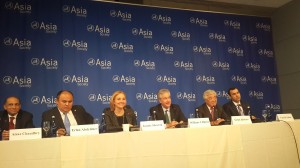 NEW YORK – Kazakh Foreign Minister Erlan Idrissov said his country is adamant to work with other partners in Central Asia and beyond to turn one of the region’s greatest challenges, its “land-lockedness”, into one of its greatest advantages, “land-linkedness”, through the restoration and expansion of trade, energy and transportation links along the ancient Silk Road under a new Great Gain philosophy.
NEW YORK – Kazakh Foreign Minister Erlan Idrissov said his country is adamant to work with other partners in Central Asia and beyond to turn one of the region’s greatest challenges, its “land-lockedness”, into one of its greatest advantages, “land-linkedness”, through the restoration and expansion of trade, energy and transportation links along the ancient Silk Road under a new Great Gain philosophy.
Idrissov spoke about Kazakhstan’s efforts on promoting regional connections through infrastructure, aid and trade at the “Expanding Economic Connectivity in Greater Central Asia” event at the Asia Society in New York on Sept. 23, an event that included U.S. Deputy Secretary of State William J. Burns as well as other representatives from Central Asia. The audience included experts on the region, business people, diplomats as well as New Yorkers generally interested in Asia.
As a matter of principle, Idrissov said, Kazakhstan stands for the mutually beneficial economic cooperation between the regional countries and outside players.
“In fact, we believe it is high time to replace the old philosophy of the Great Game of the past with the new philosophy of the Great Gain for all,” the foreign minister said, drawing nods of approval from the audience and an almost audible sigh of appreciation of the beauty of the phrase and the ideology it reflects.
“Our view on today’s subject is clear,” Idrissov said. “We support the idea of the revival of the Great Silk Road as a historical basis for cooperation among Asian countries.”
Central Asia is one of the least integrated regions in the world, he said, and, to prosper, neighbours both need to build bridges and act as bridges. Kazakhstan, under its new political and economic course, the Kazakhstan 2050 Strategy, is building highways, railroads, pipelines, logistics centres, terminals, airports, train stations and ports, as well as reaching out to its neighbours with assistance and creating its own international aid body.
Overland, the Silk Road is being revived with the $6 billion Western Europe-Western China transit corridor, which Idrissov said would be fully completed by 2015 and will allow goods to travel from China to Europe in only 10 days. In addition, “We are also expanding our internal network of motor roads connecting cities and regions never previously connected to each other,” he said.
Rail links are also being opened: to the Middle East and the Persian Gulf via the newly opened Uzen-Turkmenistan border railroad and to China and the East with the Korgas-Zhetygen railroad, he said. Last month, the new Zhezkazgan-Shalkar-Beineu and the Arkalyk-Shubarkol rail links, with a total length of more than 1,200 kilometres, 17 major stations and 31 junctures, were commissioned. “These new railroads will be a shorter route to get from the East to the Caspian and further to the Caucasus and Europe, while making it possible to move eastward all the way to the Lianyungang port on the Chinese Pacific coast,” he said.
These projects and others “will open up additional markets for our goods, boosting economic growth, creating opportunities and pockets of prosperity along highways, railways, pipelines and other lines of communications,” he added.
The New Silk Road is also about links between peoples, Idrissov said. “I think human interaction is much more powerful and enabling in the age of globalisation, instant messaging and smart devices.” He noted that Kazakhstan provides humanitarian and technical assistance to Afghanistan, including a $50 million programme to give scholarships to 1,000 Afghans to train them at the best Kazakh universities, as well as supplying food and financing infrastructural projects. Kazakhstan is also committed to supporting Afghan National Security Forces (ANSF) from 2015, he said.
“Today, we are establishing the Kazakhstan Agency for International Development, with a focus on Afghanistan and Central Asia.” The agency’s geographical focus might expand over time, he added.
Idrissov called the planned gradual reduction of troops in Afghanistan throughout 2015, which would see a small troop presence maintained in the country at the end of 2016, “responsible.” “At the same time, military withdrawal should be compensated by the increase of international assistance to Afghanistan to give the Afghan people a chance to build their future on their own, with the support of the international community,” he said. Concluding, he said, he would encourage “the United States and the global community to remain involved in our region by engaging our nations in trade, investment, scientific and cultural cooperation.” In his comments at the event, U.S. Deputy Secretary of State William J. Burns called Central Asia a region critical to global security and full of economic and human potential.
“Whether you call it the New Silk Road or the Silk Road Economic Belt, now is the moment to work together to restore this region to its historic role as a vital hub of global commerce, ideas and culture,” he said. “Our shared objectives are not to supplant the region’s vibrant East-West connections, but to supplement and complement them with equally vibrant North-South connections.”
To support integration, the U.S. would continue to support Central Asian efforts toward what he called key objectives: building a regional energy market, facilitating trade and transport, easing customs and border proceedings and promoting people-to-people ties.
U.S. Assistant Secretary for South and Central Asian Affairs Nisha Biswal, Foreign Secretary of Pakistan Aizaz Chaudhry, Ambassador of Kyrgyzstan to the U.S. Muktar Djumaliev, Ambassador of Tajikistan to the U.S. Farhod Salim and Asia Society President Josette Sheeran also spoke at the event, which was organised in conjunction with the United Nations General Assembly.
Michelle Witte contributed to this report from Astana.

